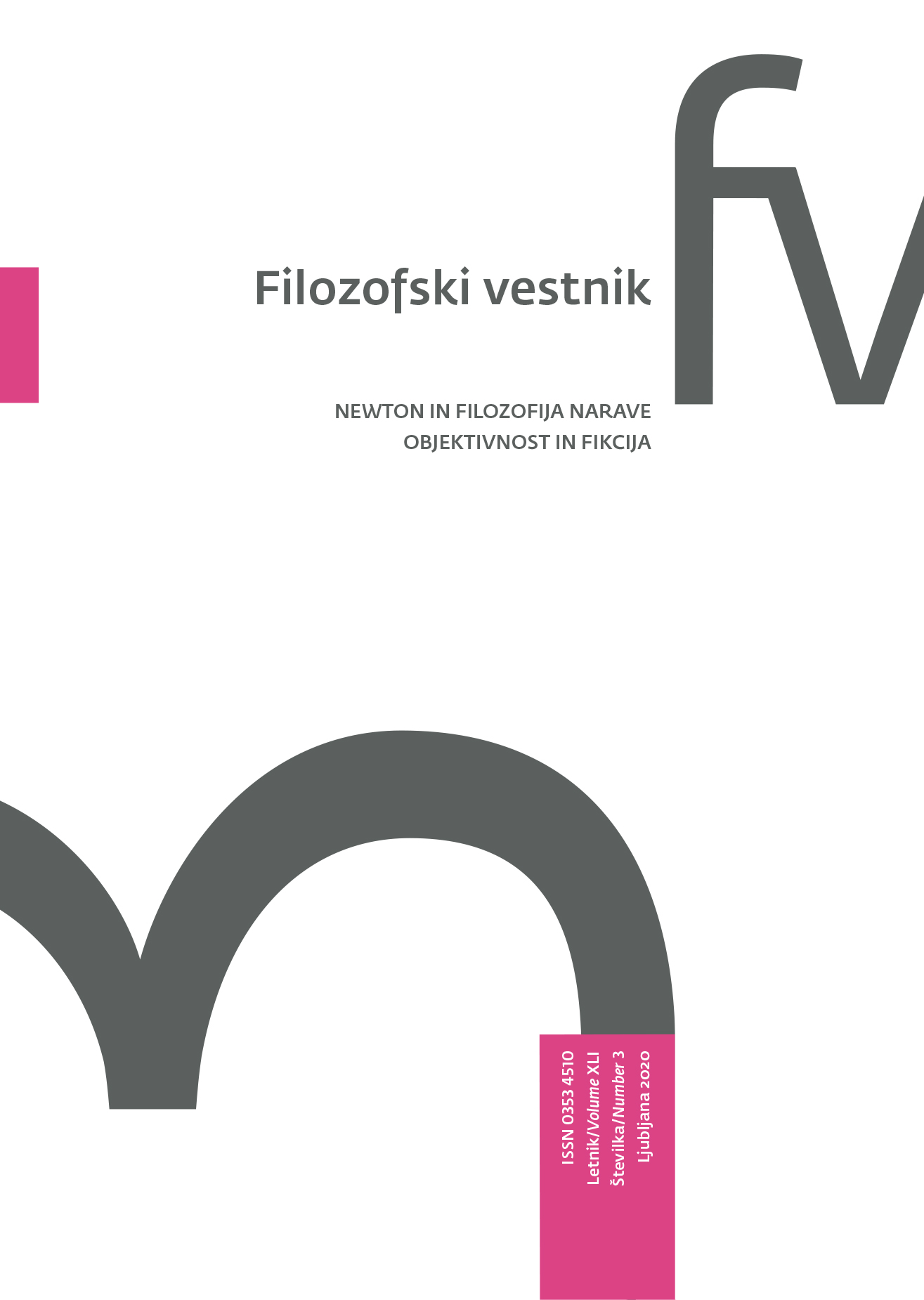Tesnoba in ontologija: k lacanovski materialistični metapsihologiji afekta
DOI:
https://doi.org/10.3986/fv.41.3.05Ključne besede:
tesnoba, ontologija, psihoanaliza, Lacan, subjektivnost, objektivnost, užitek, realno, gonPovzetek
Kljub temu, da Lacan že v svojem zgodnjem spisu »Logični čas« trdi, da je »ontološka oblika tesnobe« konstitutivni element v procesu konstitucije subjektivnosti, smo bili do sedaj priče le redkim poskusom raziskave razmerja med afektom tesnobe in Lacanovo kritiko klasične ontologije, ki ga pričujoči članek poskuša raziskati. Natančneje, članek poskuša pokazati, da je lacanovska tesnoba, za razliko od njenega Heideggerjevega pojmovanja, neločljivo povezana s tretjo dimenzijo biti, ki se nanaša na tisto, kar Lacan v Seminarju XI imenuje »nerealizirano«, se pravi, na posebno strukturo nezavednega, ki zamaje klasično ontološko nasprotje med bitjo in ne-bitjo. Za Lacana se nezavedno ne nanaša preprosto na potlačeno nezavedno vsebino, ampak je strukturirano okrog »predontološke« zevi (Lacan) oziroma »ontološke negativnosti« (Zupančič). Za tesnobo, ki po Lacanu »ne vara«, lahko rečemo, da ne vara tako glede subjektovega soočenja z realnim, kot tudi, kar je še pomembneje, glede specifične strukture nezavednega, ki vključuje negativnost kot svoj lasten »materialni vzrok«. S tega vidika lahko rečemo, da je tesnoba »ontološki« oziroma celo objektivni materialni afekt, vendar ne v posthumanističnem smislu afekta same biti/materije, temveč prej v smislu afektivnega korelata oziroma materialnega signala za razpoko v sami biti. Brez te specifične ontološke zevi/negativnosti, bi obstajala zgolj strah in frustracija, nikakor pa tesnoba. To pa je tudi tisto, kar tesnobo pripelje v domeno metapsihologije.
Prenosi
Literatura
Copjec, Joan, “May ’68, The Emotional Month”, in Lacan: The Silent Partners, ed. Slavoj
Žižek, Verso, London 2006
Depelsenaire, Yves, Une analyse avec Dieu: Le rendez-vous de Lacan et de Kierkegaard, La
Lettre volée, Brussels 2004
Freud, Sigmund, “Repression”, in The Standard Edition of the Complete Psychological
Works of Sigmund Freud, Vol. XIV, ed. and trans. James Strachey, Vintage, London
— “Inhibition, Symptom, and Anxiety”, in The Standard Edition of the Complete
Psychological Works of Sigmund Freud, Vol. XX, ed. and trans. James Strachey,
Vintage, London 2001
Harari, Roberto, Lacan’s Seminar on Anxiety: An Introduction, trans. Jane C. Lamb-Ruiz,
The Other Press, New York 2001
Heidegger, Martin, “What Is Metaphysics?”, in Pathmarks, ed. William McNeill,
Cambridge University Press, Cambridge 1998
Johnston, Adrian, “From Signifiers to Jouis-Sens: Lacan’s Senti-Ments and Affectuations”,
in Adrian Johnston and Catherine Malabou, Self and Emotional Life: Philosophy,
Psychoanalysis, and Neuroscience, Columbia University Press, New York 2013
Johnston, Adrian and Catherine Malabou, Self and Emotional Life: Philosophy, Psychoanalysis
and Neuroscience, Columbia University Press, New York 2013
Jöttkandt, Sigi, First Love: A Phenomenology of the One, Re.Press, Melbourne, 2010
Kierkegaard, Søren, “Sickness Unto Death”, in Fear and Trembling and Sickness Unto
Death, trans. and with notes Walter Lawrie, Princeton University Press, Princeton
— The Concept of Anxiety: A Simple Psychologically Orienting Deliberation on the
Dogmatic Issue of Hereditary Sin, Kierkegaard’s Writing VIII, ed. and trans. Riedar
Thomte, Princeton University Press, Princeton 1980
Klepec, Peter, Matrice podrejanja: Kapitalizem in perverzija 2, Društvo za teoretsko psihoanalizo,
Ljubljana 2019
Lacan, Jacques, “The-Names-of-the-Father”, trans. Jeffrey Mehlman, October 40 (Spring
, pp. 81–95
— The Seminar of Jacques Lacan, Book VII: The Ethics of Psychoanalysis, trans. Dennis
Porter, W. W. Norton & Co., London and New York 1992
— The Seminar of Jacques Lacan, Book XI: The Four Fundamental Concepts of
Psychoanalysis, trans. Alan Sheridan, W. W. Norton & Co., London and New York 1998
— The Seminar of Jacques Lacan, Book XVII: The Other Side of Psychoanalysis, trans.
Russell Grigg, W. W. Norton & Co., London and New York 2006
— “The Mirror Stage as Formative of the I Function as Revealed in Psychoanalytic
Experience”, in Écrits: The First Complete Edition in English, trans. Bruce Fink, W. W.
Norton & Co., London and New York 2006
— “Logical Time and the Assertion of Anticipated Certainty: A New Sophism”, in Écrits
— “The Subversion of the Subject and the Dialectic of Desire in the Freudian
Unconscious”, in Écrits
— “Science and Truth”, in Écrits
— The Seminar of Jacques Lacan, Book X: Anxiety, trans. A. R. Price, Polity Pres,
Cambridge and Malden 2014
— Lacan, Jacques, The Seminar of Jacques Lacan, Book XX: Encore, W. W. Norton & Co.,
London and New York 1998
Miller, Jacques-Alain, “On Perversion”, in Reading Seminars I and II: Lacan’s Return to
Freud, ed. Richard Feldstein, Bruce Fink and Jannus, State University of New York
Press, New York 1996
— “Paradigms of Jouissance”, trans. Juan Jauregi, Lacanian Ink 17 (2000)
— “Introduction to Reading: Jacques Lacan’s Seminar on Anxiety”, trans. Barbara P.
Fulks, Lacanian Ink 26 (2005)
Nedoh, Boštjan, Ontology and Perversion: Deleuze, Agamben, Lacan, Rowman and
Littlefield International, London and New York 2019
O’Neill Burns, Michael, Kierkegaard and the Matter of Philosophy: A Fractured Dialectics,
Rowman and Littlefield International, London and New York 2015
Ronen, Ruth, Aesthetics of Anxiety, State University of New York Press, New York 2009
Tomšič, Samo, The Capitalist Unconscious: Marx and Lacan, Verso, London 2015
Wolf, Bogdan, Anxiety between Desire and the Body, Routledge, London 2019
Zupančič, Alenka, “On Repetition”, Sats – Northern European Journal of Philosophy 8
(1/2007), pp. 27–41
— What Is Sex?, MIT Press, Cambridge 2017
Slavoj Žižek, “Against the Politics of Jouissance”, available at: https://www.lacan.com/
zizliberal.htm (retrieved: September 16, 2019)
Prenosi
Objavljeno
Kako citirati
Številka
Rubrike
Licenca
Avtorji jamčijo, da je delo njihova avtorska stvaritev, da v njem niso kršene avtorske pravice tretjih oseb ali kake druge pravice. V primeru zahtevkov tretjih oseb se avtorji zavezujejo, da bodo varovali interese založnika ter da bodo povrnili morebitno škodo.
Podrobneje v rubriki: Prispevki





